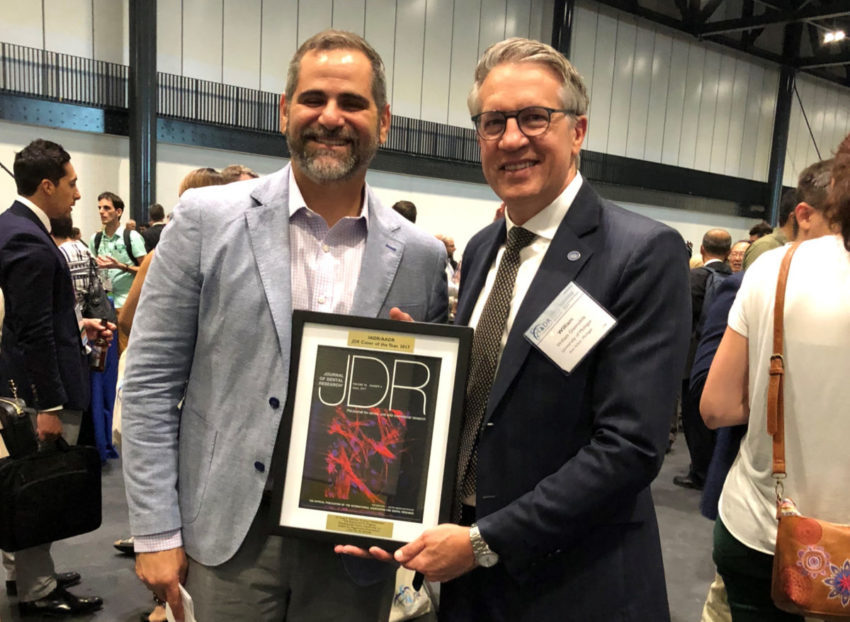Dr. Anibal Diogenes and his team received the Journal of Dental Research cover award for their study using discarded wisdom teeth for human tooth regeneration.
SAN ANTONIO (Aug. 20, 2018) ― A team of dental researchers from UT Health San Antonio were honored July 25 with the Journal of Dental Research (JDR) Cover of the Year Award for 2017. The award was presented during the opening ceremonies of the 96th General Session of the International Association for Dental Research, held in conjunction with the IADR Pan European Regional Congress General Session & Exhibition in London.
The journal cover represented the research of Anibal Diogenes, D.D.S., M.S., Ph.D., associate professor of endodontics in the School of Dentistry, and his research team for the June 2017 edition of the JDR. Their research focuses on a new method to generate a scaffold for stem cells from healthy extracted human wisdom teeth that would otherwise be discarded.
As background, permanent human teeth do not stop maturing until approximately three years after they erupt in the oral cavity. If an injury, such as trauma to the tooth or a cavity, causes an infection inside of the tooth, a root canal is necessary. During a conventional root canal, dentists stop the infection and place an inert, sterile material inside the tooth. However, the tooth stops growing and is more susceptible to fractures.
Over the past decade dental researchers, including Dr. Diogenes, have been exploring the possibility of tooth regeneration in which living dental stem cells, found near the roots of healthy teeth, are placed on a scaffold material to grow new dental pulp cells. These cells are then placed inside the damaged tooth to enable it to continue growing and developing. Although research has shown the viability of tooth regeneration, there have been no reliable ways to grow and nurture the stem cells into the specialized cells needed for placement inside the tooth. The issue, he says, is with the scaffold material upon which the endodontic cells are grown.
In this laboratory study, the team evaluated three methods for developing scaffold material for cellular regeneration. All three methods used thin slices of healthy wisdom teeth collected from patients ages 17 to 25, and an apical papilla stem cell line developed in 2012 by Nikita Ruparel, D.D.S., M.S., Ph.D., assistant professor of endodontics in the School of Dentistry, and Dr. Diogenes. Similar scaffold generation protocols had previously been proven to successfully regenerate other types of tissues but had not been used as a method to regrow the pulp of human teeth. One method was developed to grow human cornea cells (Choi et al 2010) , the second was used for regenerate porcine dental buds (Traphagen et al. 2012 ) and the third helped successfully grow rat kidney cells (Song et al. 2013).
The researchers found that the second protocol, used to regenerate tooth cells in pigs, came the closest to nurturing human stem cells.
“Further studies are needed to learn if this is indeed a viable way to regenerate human teeth, but it shows a lot of promise,” Dr. Diogenes said. “Since this study was published, we have further investigated new ways of enhancing this natural scaffold, and we are moving into in vivo testing using translational models of tooth regeneration. The beauty of this approach is that it uses human tissue that is routinely thrown away. If we can further develop this method, it could open up great possibilities to help millions of young people in the U.S. who need root canals each year.”
Other researchers on the study were Dr. Ruparel; and Je Seon Song and Koyo Takimoto, both visiting post-doctoral students from the Department of Pediatric Dentistry at Yonsei University in Seoul, Republic of Korea; and Joseph Vadakekalam, an undergraduate summer research student.
# # #
For current news from the UT Health Science Center San Antonio, now called UT Health San Antonio™, please visit our online newsroom, like us on Facebook or follow us on Twitter.
# # #
The University of Texas Health Science Center at San Antonio, now called UT Health San Antonio®, is one of the country’s leading health sciences universities. With missions of teaching, research, healing and community engagement, its schools of medicine, nursing, dentistry, health professions and graduate biomedical sciences have produced 35,850 alumni who are leading change, advancing their fields and renewing hope for patients and their families throughout South Texas and the world. To learn about the many ways “We make lives better®,” visit www.uthscsa.edu.


